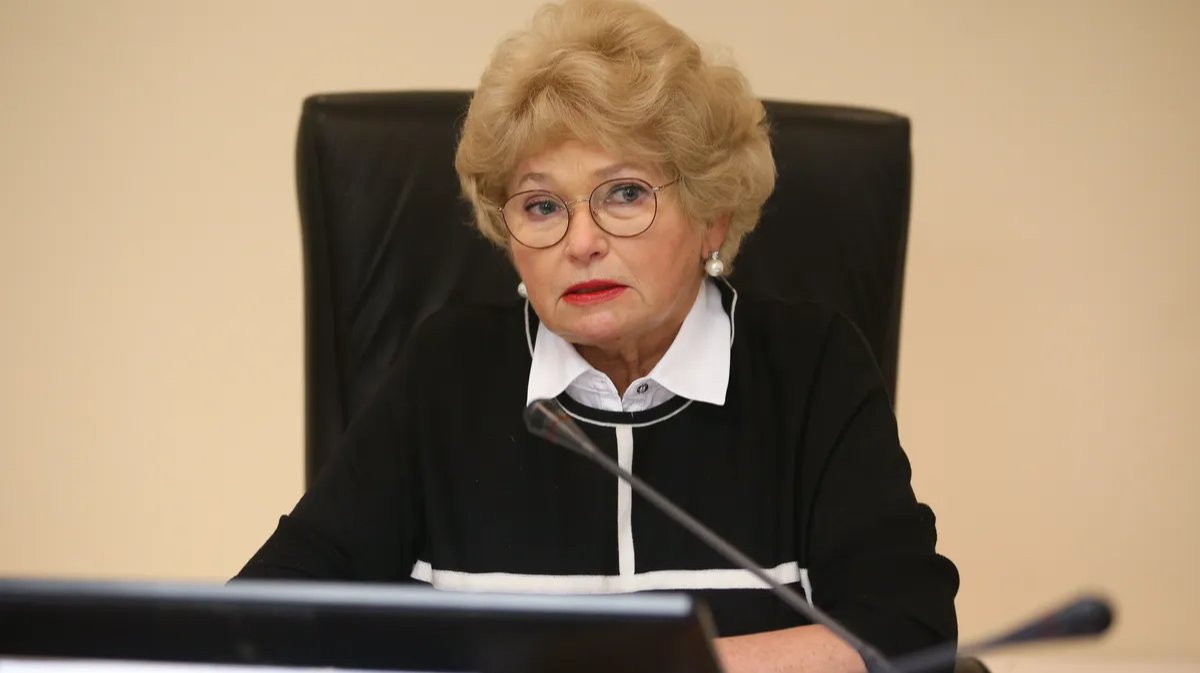Out of 170 members of the Russian Federation Council (the upper house of parliament), only Tuva senator Lyudmila Narusova voted against the digital summonses bill. “Let us not stretch the truth here,” she said as she spoke to fellow senators. The latter first suggested that she be deprived of the right to speak, and then offered her to “have a cup of tea”.
Mrs. Narusova, these words of yours about not stretching the truth, they are sort of a leading idea of your earlier speeches, not just the latest one, am I correct?
Absolutely. The thing is that we cannot even call a spade a spade.
You spoke against raising the retirement age and against the bill on “discrediting the military”. You were also the first major official to mention conscripts fighting in the Ukraine war, which you did in March 2022, and so on. Do you have any like-minded fellow senators out of those 170, or are you all alone there?
I guess it would be immodest to say so… Well, I’m the only one who votes [against]. But there are enough people who think the same as me. It’s just that they are afraid to speak it out loud. The recent situation with the conversation between Farhad Akhmedov and Iosif Prigozhin shows that although the biggest supporters [of the current policy] participate in all those events at Luzhniki Stadium or in the Red Square, this does not mean that they actually support sincerely what’s going on.
They may be of a completely different opinion. But law-making is organised in such a way that people are afraid to express their opinion, their beliefs, let alone to stand up for them.
I’m not asking you for names, but do these people, in private conversations with you, for instance, mention their opinion in case it matches their own?
They do, but they keep their voice down to avoid being heard or noticed.
Why are they afraid to say it out loud and you are not?
I was given a compliment after that speech of mine, and a very questionable one. One very respectable man with many years behind his belt said this to me: “You’re the only one among us with balls of steel.” Certainly, you can’t print it…
Why? We’ll print it.
Really? That is, of course, a questionable compliment for a woman, but anyway. This is an important indicator.
Let me put it milder: a white crow [a Russian idiom similar in meaning to “black sheep” — translator’s note]. Do you feel like a white crow?
I’m more of a sparrow, since crows are known to peck. If you watched the video of my speech, you must have seen it.
How does it feel to be in this role in the upper house of the parliament?
It feels bad. I tell you this, this destroys me from within. But I realise that it’s too late for me to change. And besides, this is how my husband Anatoly Sobchak (mayor of St. Petersburg from 1991 to 1996, former boss of Vladimir Putin — translator’s note) brought me up. This is why I refer to articles of the Constitution so often. When I speak in the parliament, I do not just bark things out, but I refer to the articles of the Constitution that he wrote: the ones on human rights. And I spoke out against a smear campaign targeting actors and creative intellectuals the same way as well. Preserving my husband’s ideals, trying to fight for them, has been my number one goal all these 23 years after he passed on, no matter how dramatic it sounds.
Memory is not only coming to someone’s grave and shedding a tear or laying a bunch of flowers. Memory has to be of use, you must stand up for what you remember.
This is how he brought me up, my number one teacher of politics. If something is written in the Constitution, but is treacherously and obligingly violated, then I cannot help but talk about it and even shout about it.
What’s the point of being the only person who talks and shouts about it but cannot change the way things are?
The point is to make people hear, just like you did. My voters hear it, and it gives them a wake-up call for some kind of consciousness. This creates gleams of thought, gleams of doubt amid this mass psychosis. I believe that is the primary function of what I do.
Where and how can you see these gleams of thought and doubt in person? Who do you speak with to see this?
Go ahead and read the comments people send me from Tuva. My phone is full of those comments. If people write things like that, it means they are starting to think, right?
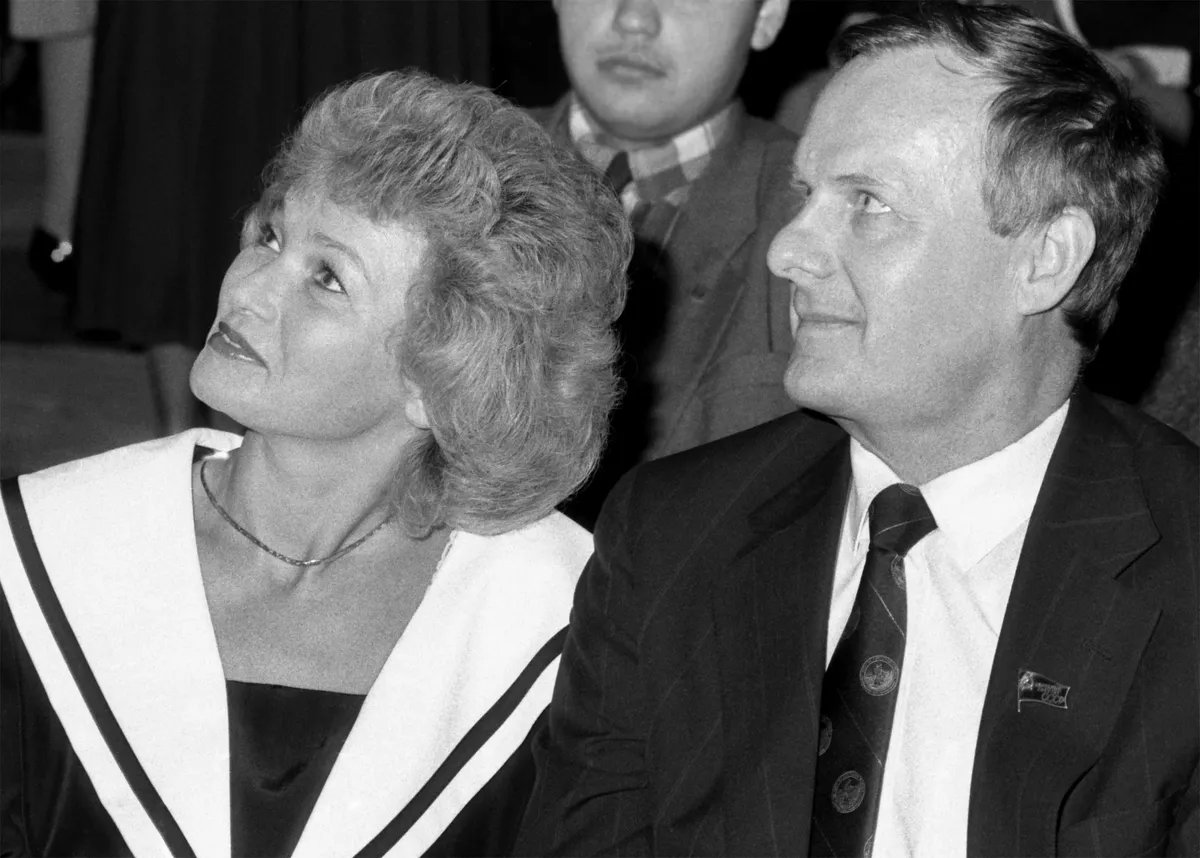
Lyudmila Narusova and Anatoly Sobchak, 1990. Photo: Lev Medvedev
Comments are good. Is there any other place you can notice this other than your phone?
Yes, there is. People approach me in the street, in theatres. I’m an active theatre-goer, and people approach me there. In shops, too. Some random people approached me at the dry cleaner’s yesterday.
Mrs. Narusova, do you go to the dry cleaner’s on your own?
Well, that’s how it happened the other day. I brought my jacket there. And there was one woman, I don’t know what she brought. She was surprised at first, same as you. And then she said to me: “Listen, my son is of conscription age, he follows all the news, can I give him a call? He wouldn’t believe me that I met you otherwise.” So, she gave him a video call. The young man saw his mother, and me standing beside her. He said: “Thank you very much for defending us.”
I bet many of your fellow senators realise that things like that should be said in the parliament?
They do realise… But have you heard [Russian senator Andrey] Klishas’s speech?
Unfortunately, I did, yes.
Judging by how Valentina Matviyenko [the senate speaker] reacted to the suggestion that I should be deprived of my right to speak, she realises everything as well. She is an experienced person, and a very smart one, too.
Unlike the former Speaker of the State Duma [Boris Gryzlov], she realises how absurd the “parliament is not a suitable place for discussion” phrase is.
Is this why she suggested that you go and have a cup of tea?
She said that to ease the tension. She did not deprive me of my right to speak, though.
They do not deprive you of this…
For now, they don’t.
Yes, but they let you speak and do not kick you out. Why?
Because there is no legal procedure that allows to kick a senator out.
Our laws do not allow many things, and yet they happen. So, why don’t they touch you?
Anything is possible. I’m not sure they won’t do it at some point. But the way delegating works in the Federation Council, this has not happened so far. And I will keep using this opportunity.
Is it the fact that you are acquainted with Vladimir Putin that protects you?
I last met him three years ago, long before the military operation. Although I declared my stance immediately, on 25 February 2022. No, I don’t think it protects me.
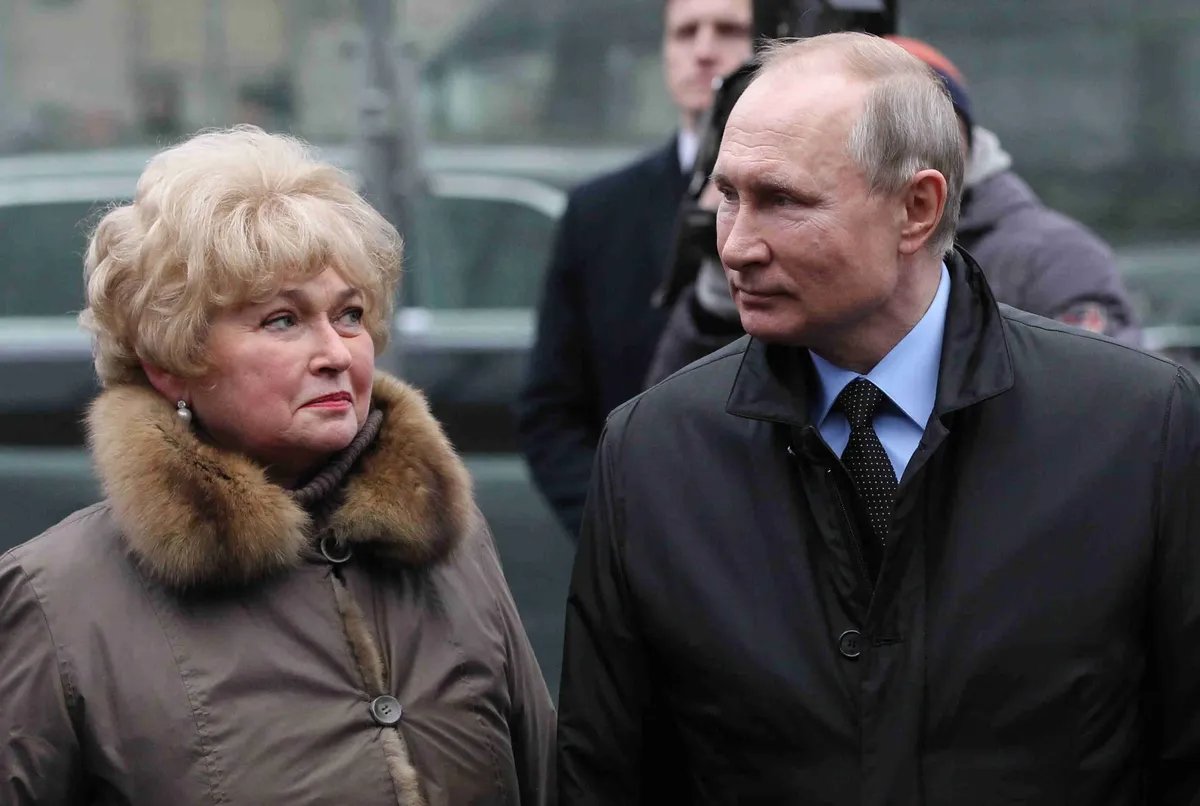
Lyudmila Narusova and Vladimir Putin at a ceremony commemorating 20 years since the death of Anatoly Sobchak, 19 February 2020. Photo: Mikhail Svetlov / Getty Images
You don’t need to meet him in person, do you? Maybe there are some kind of “wings of protection” over you…
How do you see this? Do you think I might be calling him and asking if I could speak in the parliament?
This is how I see it: they are afraid to touch you. Am I wrong?
No, look. They touch me, and in a big way, but it works differently.
For instance, I was not included in any Federation Council delegation that travels somewhere in recent years. Not even Tajikistan, not even some Russian region.
It appears that I have a bad reputation, that’s why I’m never there. Moreover, when this bill was still being passed and it was still possible to somehow try and convince the MPs, put forward some reasoning so that it would not be adopted, or at least to suggest amendments, I turned to the chief editor of the Parliamentary Newspaper. I told him I would like to publish an article. He turned me down.
How did he turn you down? What did he say?
He promised to send a reporter to me, and did not send anyone. So, I had no opportunity to give an interview or publish some of my own writing.
Can you simply write an article and send it to the Parliamentary Newspaper?
No, I can’t. I also have no opportunity to speak out. I mean, all I have is a microphone that can be switched off at any moment. And this is how our Parliamentary Newspaper deals with things.
As far as I’m concerned, you were not the only person Anatoly Sobchak brought up; we used to consider Vladimir Putin an apprentice of his some time ago…
You can’t compare us; our background is different. I came from academia: university, postgraduate education, working as a lecturer in college. Where did Putin come from? We hail from completely different environments, and you can’t compare us. Moreover, Sobchak never mentored him, they used to work together. And even before Sobchak became known as a politician, I was already married to him for a quarter of a century. So he formed me completely. Sometimes we used to argue about things until we both were blue in the face.
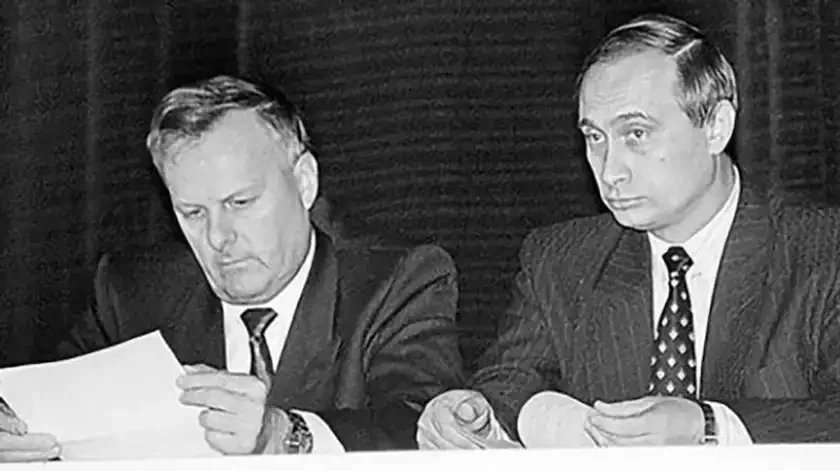
Anatoly Sobchak and Vladimir Putin
But many people did see Putin as an apprentice of Sobchak in the early days of his rule.
And this is why I received so many calls back then. People used to say: we voted for Putin because he used to work with Sobchak. Yes, this is how things were. But people transform into something completely different after 20 years. Especially people who are in office for so long. Of course, he remembers Anatoly on his birthday, sometimes he even visits his grave when he is in St. Petersburg to pay his respects. But… But everything changes in this life.
Is there any way you can address Vladimir Putin?
As I said, the last time this happened was three years ago. It was 20 years since Anatoly’s death in February 2020. So, there was a commemorative concert in the Philharmonic, the Vladimir Spivakov orchestra was playing, and Putin was present.
Is it your mutual relationship with Putin or your attitude towards him that prevents you [from contacting him]?
It’s just that I never ask for things. This is my principle. Well, what do you think? I’m not one of the oligarchs or large entrepreneurs. And this principle gives me freedom, by the way.
I didn’t mean asking Putin for things. Do you think he has a sound perception of reality? Or does someone need to tell him: “Hey, look what’s actually going on”?
It appeared to me three years ago that he had a sane perception of reality. But many things have changed after these three years, and I never got to make sure of this myself. I don’t know.
You spoke against many bills in the Federation Council. Have you managed to achieve anything, to make some of your fellow senators change their minds?
Only once. I don’t remember what bill that was, but one person abstained.
And that’s it?
That’s better than nothing.
What function do they serve and why are they there at all? If it is assumed from the very start that everyone votes in favour, what is this institution for?
I must correct you here: the Federation Council is in the Constitution.
I guess the Constitution mentions some other kind of function for it other than simply approving every single thing.
Don’t ask questions like that, or you might be charged with refusal to abide by the Constitution.
Actually, I am a vocal supporter of abiding by it, this is why I’m asking you why a parliament like this is needed at all.
There was a shift in the public conscience at some point. I feel that this becomes especially clear when I think of the recent headline-making criminal cases. The people of my generation and of the younger generations grew up during the time of rallies for peace. And now they deprive a girl of her family for a drawing, and her father is sentenced to prison time. How could this happen to society?
Yes, how could this happen that there is a school teacher who reports a child because of an anti-war drawing?
This is how it happened: step by step, the repressive laws first banned rallies, then single pickets, and then it banned even speaking up for peace. A woman was detained in St. Petersburg. A survivor of WW2 and the Siege of Leningrad, she stood there with a banner reading “No to war”. How is that possible?
I am perplexed by the fact that the law enforcement is ready to execute such orders, and the fact that the society is also fine with it. What is that? Where did this social corrosion come from?
Michel de Montaigne wrote this: “The first sign of the spoiling of social mores is the disappearance of truth, for truthfulness underlies every virtue.” And this started much earlier than today or yesterday.
When did it happen? When did you notice that the corrosion had started?
I believe it started after the Beslan siege, after direct gubernatorial elections were cancelled. People would swallow this whole thing in small portions, and it was explained by political expediency. Gradually, this led us to where we are now.
You certainly had a choice of your own: to leave the country, to go into some sort of “internal exile”, or to stay in politics?
Sure, I have this choice now, too. But to leave the country to live a life of ease is unacceptable for me. In 1997, the smear campaign against my husband was so bad that the chief of the Kirov Military Medical Academy, a hospital where my husband was admitted after a heart attack, was receiving calls that said: stop giving him treatment, let him drop dead.
I took all the necessary measures back then to take him to Paris where he received treatment and underwent surgery. I spent 21 months with him there after this. I know what it is like living abroad. And not just “someplace abroad”, but in Paris, a city that I used to think of as “a moveable feast” previously. It is very painful, very difficult, and very demeaning. So, I have my own experience of such kind, and leaving the country is unacceptable for me. At the same time, I do not condemn people who moved abroad.
You are a person with an active stand and no opportunity to actually affect things. What do you choose for yourself?
To remain with this stand, there is no other way. It is important for me personally, because it also means preserving the memory of my husband. If I shut up and go into “internal exile” or move to some warm land… At the risk of sounding grandiose, this would be a betrayal of my husband’s memory.
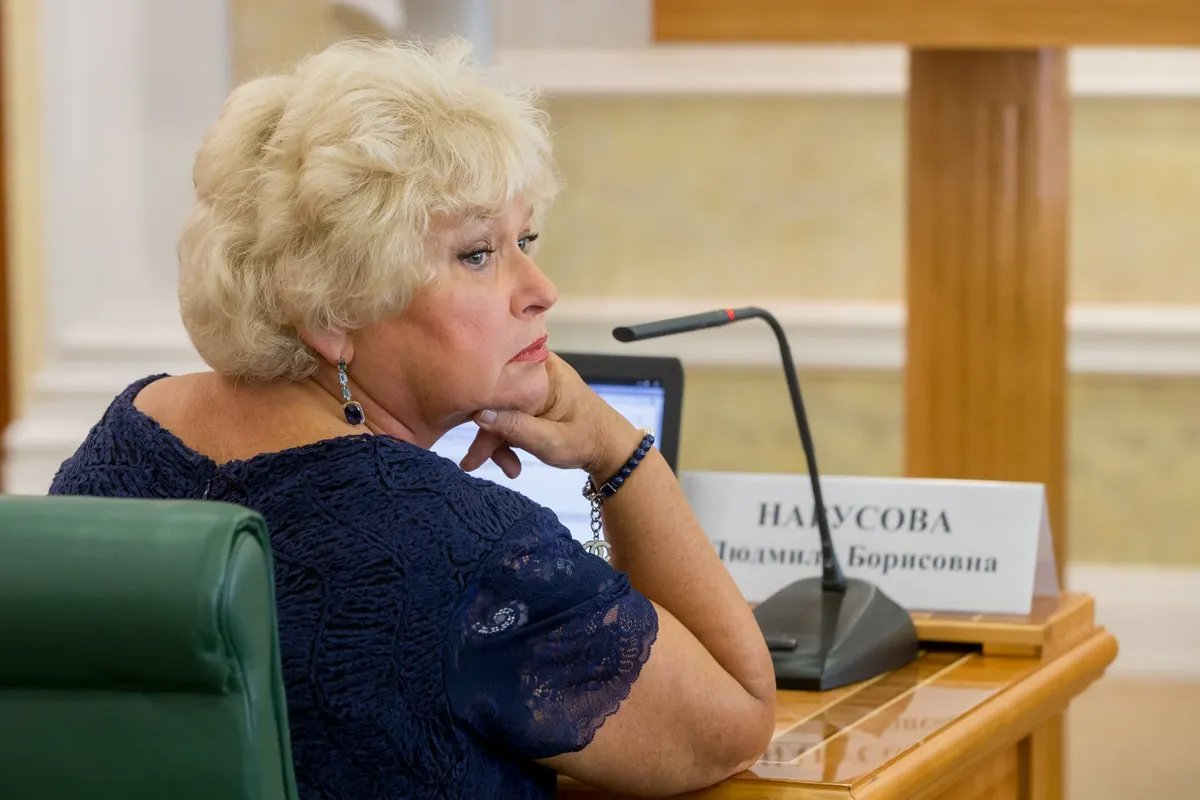
Lyudmila Narusova. Photo: the Federation Council
Aren’t you afraid that some of your speeches might end up in a criminal case against you? Or do you feel protected?
This happened to me before as well. Back in the day, Prosecutor General Skuratov initiated a criminal procedure against me for libel. I was spreading my word in all sorts of places, fighting for my husband, and I said that the case was a frame up, falsified by the prosecutor’s office. Let me repeat myself: I refer to the Russian Constitution in my speeches. If this might be a reason to initiate a criminal investigation, then it’s game over, as they say.
Prosecutor Skuratov is from a different era, and he is a different prosecutor.
Nothing has really changed. Are there no frame ups these days?
That’s why I’m asking you if you are afraid.
Perhaps this is my biggest drama. Shortly before he died, Sobchak, who felt the taste of unlawful persecution, instructed presidential candidate Putin: “The most important thing is that law enforcement does not turn into law encroachment.” He designed a full vision of how a rule-of-law state should be created, and how to create independent courts. He even created that slogan Putin used to run for president…
The one that goes “dictatorship of the law”?
Yes. It was all there, and sadly, it was all lost.
Support independent journalism
I remember I was unsettled by the word “dictatorship” back then.
It was offered as an alternative to the “dictatorship of the proletariat”.
I get it, but maybe that was the problem: a dictatorship was declared back then, and we somehow missed it?
It was “dictatorship of the law” after all. If it was present today… Here’s an example I often share with prosecutors when they attend our sessions. A St. Petersburg lecturer of history murdered and dismembered his lover before throwing her body into the river in a plastic bag, and was sentenced to?
To twelve years in prison for cynical murder with extreme atrocity. At the same time, a person who “discredits”, or criticises the military may face twenty years behind bars.
Or even 25 years if he says that somewhere in Arizona, as we know now.
For words! Not for deeds, but for words. This is what our justice led us to. Words are worth more prison time than murder.
These sentences are based on current laws. Isn’t that “the dictatorship of the law”? And those laws happen to be adopted with you in the parliament. Don’t you feel like being an accomplice of this “dictatorship”?
This is why I vote against. I don’t want to be an accomplice of all this militarist law-making.
Wouldn’t you feel more freedom to speak if you quit your Federation Council membership?
Nobody is going to hear me this way. The point of my activity is educational, as I see it. People need to be told something; they need things to be explained. I receive dozens of messages that go: thank you, you gave us hope that there is still rectitude.
Is that exactly what they text you?
Yes, this is exactly what they text me.
Join us in rebuilding Novaya Gazeta Europe
The Russian government has banned independent media. We were forced to leave our country in order to keep doing our job, telling our readers about what is going on Russia, Ukraine and Europe.
We will continue fighting against warfare and dictatorship. We believe that freedom of speech is the most efficient antidote against tyranny. Support us financially to help us fight for peace and freedom.
By clicking the Support button, you agree to the processing of your personal data.
To cancel a regular donation, please write to [email protected]
